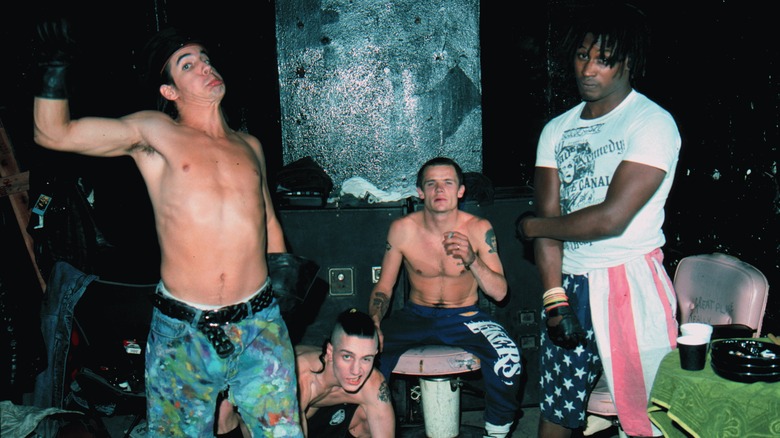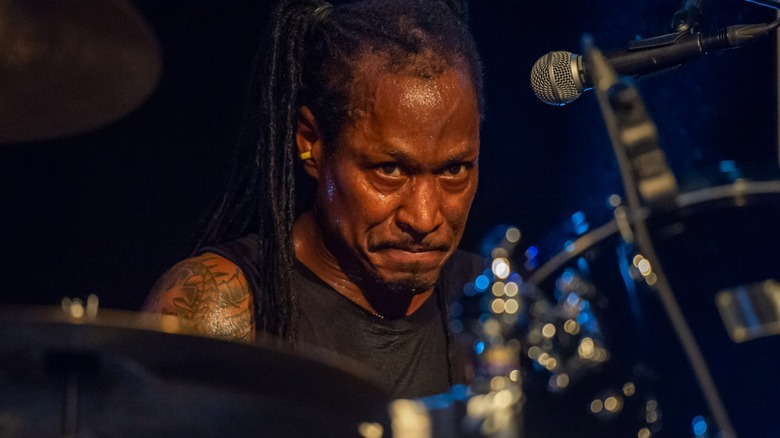How DH Peligro Broke Down Barriers In The Punk Scene
One of the most notable aspects of Punk rock music is how unabashedly anti-status quo it often is. As Britannica explains, what is now known as punk rock largely came about in the 1970s and 1980s. This movement spiraled from the inert angst and restlessness of a whole youth generation, congealing into hard-hitting raw soundscapes that penetrated the establishment. At the forefront of this movement were bands such as The Ramones, Patti Smith, Black Flag, Sex Pistols, the Clash, and many more.
One of the most famous acts of this genre is the Dead Kennedys. As AllMusic says, the band is known for their aggressive left-wing lyricism and rough, in-your-face attitudes. The drummer of the band, D.H. Peligro, tragically passed away on October 28th, 2022 after an accidental fall at his home, according to a post on the Dead Kennedy's Twitter account. But what he left behind was an enormous Punk rock legacy. He even managed to break down a few racial barriers in punk too.
D.H Peligro was a Punk musician in a time when few black people were in punk bands
D.H. Peligro was one of the most renowned drummers in the punk rock world. As The Guardian explains, Peligro was a replacement drummer for the Dead Kennedys from the year 1981 onward until the band's dissolution in 1986. He and the band eventually came back together in 2001, and Peligro played with them until his untimely and tragic death at 63 years old. Peligro also had a brief drumming stint with the band Red Hot Chili Peppers, though was eventually fired.
Peligro played punk rock in an era where few Black people were in punk bands. As Hyper Allergic says, racism was unfortunately prevalent in some rock circles. In the early punk days in the U.K., this led to various bands denouncing the racism that some of their fans expressed, resulting in the Rock Against Racism movement in the 1970s. As punk made its way to the U.S., the 1980s punk scene initially had less of a social consciousness about racism. According to the Society of U.S. Intellectual History "nonwhite identities were often ignored or suppressed in the 1980s punk scene." Most punk musicians were white, and "racist skinheads" made up a faction of the punk scene.
Still, many punk musicians were not on board with the racist views of some of their fans, including Black Flag, and the all-Black punk band Bad Brains, per GQ. In 1981 The Dead Kennedys even released the song "Nazi Punks F*** Off" in support of their friend and drummer.
D.H Peligro broke various racial barriers in punk
Despite this racism, Peligro saw fit to play with a white punk band anyway, helping to break down barriers that often-held Black people out of punk altogether. D.H. Peligro's legacy isn't just his music, but also what he did for Black representation in punk music. He proved that the music wasn't just for white people — it was for people of all colors. But it wasn't easy.
According to LA Weekly, even a monstrous punk talent like Peligro couldn't avoid racism. "You go down South, you go across the Midwest, then people were thinking that it was music for white people, or I was the janitor or security or something," he told LA Weekly. "It's a bit more open and accepted today, but there's still pockets of people who want to use punk rock to create hate music. That angers me to no end."
According to The Morning Call, Peligro occasionally said he even had trouble getting on stage with his own band. Sometimes doormen at concerts wouldn't let him in backstage because they didn't believe he was with the Dead Kennedys. "I would usually have to get the road crew to tell the door guy to let me in," he told The Morning Call. Peligro played on, despite the racism received, and became an immensely beloved musician in the world of punk for decades onward.


